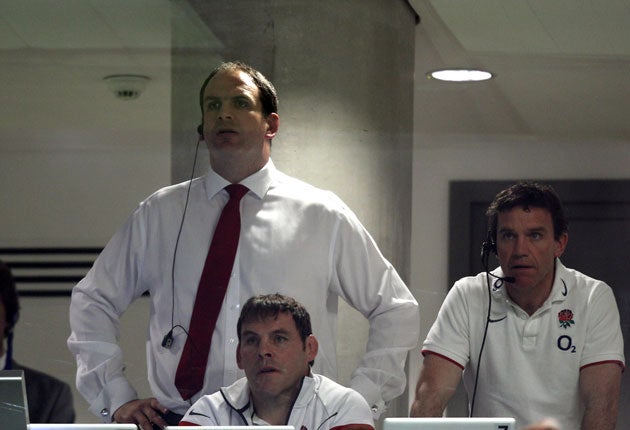Johnson's men take reality check
After Dublin defeat, England's World Cup hopes look lost in fog of uncertainty

The great guru of gridiron Vince Lombardi once said: "Some people try to find things in this game that don't exist." Not Martin Johnson, who likes his American football – no, he loves it – and as the England rugby manager does a convincing line in Lombardi-isms.
What is the international game to him? "It's about finding ways to win Test matches," he always says. Last night Johnson's team failed to find a way past Ireland and missed out on a Grand Slam, forcing a drastic reconsideration of this young side's readiness for the next challenge – the World Cup.
The emphatic nature of this defeat left an estimated 20,000 English fans in the Irish capital plus the millions more tuning in at home in a fog of uncertainty over whether they could even celebrate the fallback blessing of the return to Twickenham of the Six Nations trophy, for the first time since Johnson's captaincy in the glory, glory year of 2003. There were a couple ofanxiety-laden hours to wait while Wales held the chance of overtaking England on points difference with a big win in Paris.
After a surge of public confidence in the painfully overdue emergence of a renewed force, there is, now, a long way still to go in every sense. This England, Johnson's England, have yet to defeat either New Zealand or South Africa and will almost certainly have to do so to win the World Cup Down Under in October. It is a Slam in global disguise because it requires victory in five big matches:against Argentina and Scotland in the pool (with due respect to the makeweights Georgia and Romania), followed by a quarter-final, semi-final and final to win it. And all, as yesterday, on foreign soil: New Zealand soil, what's worse.
Johnson played through all but one of England's Five/Six Nations campaigns when they went the seven seasons from 1996 to 2002 without a Slam. In that period they won 24 of 31 Championship matches, three titlesand four Triple Crowns. In the seven years post-2003 to 2010 – with Johnson retired in 2004 and becoming the boss as a successor to Clive Woodward, Andy Robinson and Brian Ashton in 2008 – they won 18 and drew one of 35 matches, no titles and no Triple Crowns. A run that has been leaner than Kate Moss on a crash diet.
It appeared English rugby was back on an upward slope. Someone wrote of American football: "[It] doesn't build characters. It gets rid of weak ones" and there had been an element of that as Johnson went asset-stripping in what some saw as the fatally flawed sidelining of talents such as Mathew Tait, Danny Cipriani,Luke Narraway, James Simpson-Daniel and Olly Barkley. The early captain, Steve Borthwick, went too: a usefulness outlived.
Johnson or no Johnson, maybe élan and off-the-cuffness is under attack from the modern ways of GPS systems measuring every metre a playerruns and coaches analysing laptop replays and multiple substitutions. Jonny Wilkinson and Mike Tindall, two survivors of 2003, have referred to the massive change in the physical demand on players, with massive being the operative word. Johnson invested in might in the midfield with Tindall, Shontayne Hape and Matt Banahan. Before Hape's promotion, the choice at inside-centre was Riki Flutey – then he got injured, an affliction throughout the squad that obviated any sound judgement of Johnson when results remained dire in the doldrums of autumn 2009.
The good news for Johnson, as England's pendulum swung just a little more towards winning in the past nine months – home and away victories over Australia, and against Wales, Italy, France and Scotland in this Six Nations – is that the remaining players backed him. And along came Courtney Lawes, Ben Youngs, Ben Foden and Chris Ashton, together with an older hand in Tom Croft: all men comfortable with making exciting things happen quickly. When injuries struck this season, Tom Wood and Alex Corbisiero, in particular, stood in impressively.
"Win a team's heart," said Lombardi,"and they'll follow you anywhere, do the impossible for you." You will never hear Johnson promise the impossible. Those hard-eyed All Blacks, Springboks and, yes, the Irish – winners over the English in seven of the past eight meetings – have made England's possibilities look limited.
England's last-day nightmares
2001 The last match was delayed from rampant spring to uncertain autumn by foot and mouth disease. England went to Dublin without the injured Martin Johnson, Lawrence Dallaglio and Phil Vickery. A cute try by Keith Wood and up-and-at-'em defence gave Ireland a 20-14 win, and delirium.
1999 Wales were "hosts" at Wembley but England blew any possible home advantage. Lawrence Dallaglio's decision to press for a try backfired when Wales moved upfield and a slashing try by Scott Gibbs, which was converted by Neil Jenkins, sealed an unforgettable 32-31 victory. Scotland shattered England anew in Edinburgh rain the following year.
1990 The defeat that inspired an era of English domination, including Slams in 1991, '92 and '95. David Sole walked Scotland, who were also chasing the clean sweep, on to the Murrayfield turf and into folklore via a 13-7 win, with a dubious try by Tony Stanger and boneheaded English battering up front.
Hugh Godwin
Join our commenting forum
Join thought-provoking conversations, follow other Independent readers and see their replies
Comments
Bookmark popover
Removed from bookmarks